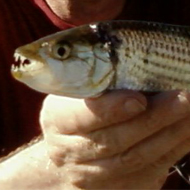African tigerfish filmed catching swallows in flight

An African Tigerfish
Scientists have for the first time filmed African tigerfish lunging out of the water to catch barn swallows in flight.
The findings, published in The Journal of Fish Biology, end more than 65-years of academic speculation about the predatory behaviour of the fish species.
The observational research was carried out by the Water Research Group (Ecology) Unit of Environmental Sciences and Management, at North-West University in South Africa.
"As far as is known, this is the first confirmed record of a freshwater fish preying on birds in flight," said co-author Nico Smit, a director at the research unit and part of a team of four who conducted the study.
They filmed for 15 days at the Schroda Dam in South Africa, during which the say as many as 300 barn swallows were caught by the fish.
This they said also proved the predatory behaviour was not occasional, as suggested in previous papers as recent as nine years ago.
"This behaviour may have been adopted out of necessity due to food availability limitations," said Mr Smit.
He added that the African fish eagle and other larger birds, probably preyed on the tigerfish as they lept out of the water to catch the swallows.
See the video here
Image by Piet Spaans



 The RCVS has announced a new version of its 1CPD mobile app, with enhanced features for veterinary surgeons and veterinary nurses to record their continuing professional development.
The RCVS has announced a new version of its 1CPD mobile app, with enhanced features for veterinary surgeons and veterinary nurses to record their continuing professional development.